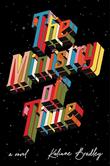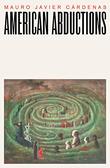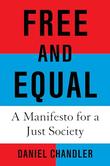
by J. Bruce Stewart ‧ RELEASE DATE: today
A well-researched, compelling case for the necessity of addressing systemic racism.
Awards & Accolades
Our Verdict

GET IT
An expert explores the legacy of systemic racism in America.
Stewart opens with a traumatic childhood story of witnessing his father fall from a balcony in an alcohol-fueled stupor. Upon later reflection, the author, who is Black, realized that his father’s anger and substance abuse stemmed not from fundamental flaws in his character but were, instead, “a reflection of the social outcomes resulting from the constraints, conditions, and inequities” imposed on Black and other marginalized people, including poor white men. During service in the military, his father had been passed over for a promotion by a white man whom he had trained, and when he questioned the decision, he was called a racial epithet by his commanding officer. Interactions such as these, the book argues, contribute to a “racism of a thousand cuts” that permeates daily life for Black people historically and into the present. Drawing upon a wealth of data, the book makes a convincing argument for the ways that “flawed systems” (such as the endurance of race-based economic injustice) and “modes of thinking” (such as the model minority myth) contribute to the perpetuation of racial bias in American life. Stewart, a former deputy director within President Barack Obama’s Office of Diversity and Inclusion, Office of Personnel Management, continues to facilitate diversity and inclusion trainings in government agencies and universities across the country and brings that deep experience to bear here. The book, via an abundance of statistical and qualitative data presented with photographs, charts, and other visual aids, efficiently outlines America’s racist history, taking on controversial thinkers, like Charles Murray, who espouses white supremacist views. Stewart offers an accessible, proactive approach to understanding and addressing racism in order to “create a truly equitable and just society.” Though academic studies are referenced throughout, scholarly readers may balk at the lack of formal citations.
A well-researched, compelling case for the necessity of addressing systemic racism.Pub Date: today
ISBN: 19.95
Page Count: -
Publisher: N/A
Review Posted Online: April 28, 2024
Review Program: Kirkus Indie
Share your opinion of this book
More by J. Bruce Stewart
BOOK REVIEW

by Matthew Desmond ‧ RELEASE DATE: March 21, 2023
A clearly delineated guide to finally eradicate poverty in America.
Awards & Accolades
Likes

12
Our Verdict

GET IT
New York Times Bestseller
A thoughtful program for eradicating poverty from the Pulitzer Prize–winning author of Evicted.
“America’s poverty is not for lack of resources,” writes Desmond. “We lack something else.” That something else is compassion, in part, but it’s also the lack of a social system that insists that everyone pull their weight—and that includes the corporations and wealthy individuals who, the IRS estimates, get away without paying upward of $1 trillion per year. Desmond, who grew up in modest circumstances and suffered poverty in young adulthood, points to the deleterious effects of being poor—among countless others, the precarity of health care and housing (with no meaningful controls on rent), lack of transportation, the constant threat of losing one’s job due to illness, and the need to care for dependent children. It does not help, Desmond adds, that so few working people are represented by unions or that Black Americans, even those who have followed the “three rules” (graduate from high school, get a full-time job, wait until marriage to have children), are far likelier to be poor than their White compatriots. Furthermore, so many full-time jobs are being recast as contracted, fire-at-will gigs, “not a break from the norm as much as an extension of it, a continuation of corporations finding new ways to limit their obligations to workers.” By Desmond’s reckoning, besides amending these conditions, it would not take a miracle to eliminate poverty: about $177 billion, which would help end hunger and homelessness and “make immense headway in driving down the many agonizing correlates of poverty, like violence, sickness, and despair.” These are matters requiring systemic reform, which will in turn require Americans to elect officials who will enact that reform. And all of us, the author urges, must become “poverty abolitionists…refusing to live as unwitting enemies of the poor.” Fortune 500 CEOs won’t like Desmond’s message for rewriting the social contract—which is precisely the point.
A clearly delineated guide to finally eradicate poverty in America.Pub Date: March 21, 2023
ISBN: 9780593239919
Page Count: 288
Publisher: Crown
Review Posted Online: Nov. 30, 2022
Kirkus Reviews Issue: Jan. 1, 2023
Share your opinion of this book
More by Matthew Desmond
BOOK REVIEW
More About This Book
PERSPECTIVES
PERSPECTIVES
SEEN & HEARD

by Alok Vaid-Menon ‧ RELEASE DATE: June 2, 2020
A fierce, penetrating, and empowering call for change.
Artist and activist Vaid-Menon demonstrates how the normativity of the gender binary represses creativity and inflicts physical and emotional violence.
The author, whose parents emigrated from India, writes about how enforcement of the gender binary begins before birth and affects people in all stages of life, with people of color being especially vulnerable due to Western conceptions of gender as binary. Gender assignments create a narrative for how a person should behave, what they are allowed to like or wear, and how they express themself. Punishment of nonconformity leads to an inseparable link between gender and shame. Vaid-Menon challenges familiar arguments against gender nonconformity, breaking them down into four categories—dismissal, inconvenience, biology, and the slippery slope (fear of the consequences of acceptance). Headers in bold font create an accessible navigation experience from one analysis to the next. The prose maintains a conversational tone that feels as intimate and vulnerable as talking with a best friend. At the same time, the author's turns of phrase in moments of deep insight ring with precision and poetry. In one reflection, they write, “the most lethal part of the human body is not the fist; it is the eye. What people see and how people see it has everything to do with power.” While this short essay speaks honestly of pain and injustice, it concludes with encouragement and an invitation into a future that celebrates transformation.
A fierce, penetrating, and empowering call for change. (writing prompt) (Nonfiction. 14-adult)Pub Date: June 2, 2020
ISBN: 978-0-593-09465-5
Page Count: 64
Publisher: Penguin Workshop
Review Posted Online: March 14, 2020
Kirkus Reviews Issue: April 1, 2020
Share your opinion of this book
More In The Series
by Shavone Charles ; illustrated by Ashley Lukashevsky
by Leo Baker ; illustrated by Ashley Lukashevsky
© Copyright 2024 Kirkus Media LLC. All Rights Reserved.
Hey there, book lover.
We’re glad you found a book that interests you!
We can’t wait for you to join Kirkus!
It’s free and takes less than 10 seconds!
Already have an account? Log in.
OR
Trouble signing in? Retrieve credentials.
Welcome Back!
OR
Trouble signing in? Retrieve credentials.
Don’t fret. We’ll find you.





